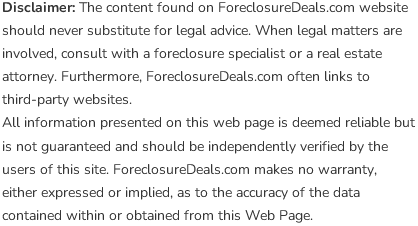
Foreclosure Laws

Learning about Foreclosure Laws
Foreclosures consistently represent some of the most affordable and advantageous deals available on any real estate market, and offer convenient ways to purchase undervalued homes for anyone from new homeowners to experienced real estate investors. Taking advantage of these purchasing opportunities means that learning about foreclosure laws - particularly how they vary from state to state - is crucial to any successful purchase.
One of the key distinctions to understand regarding different foreclosure laws from state to state is the length of time involved from the initial Notice of Default filed against the property by the lender to the actual foreclosure auction and date of sale. In some states, foreclosures proceed through the system fairly quickly. In Texas, for example, non-judicial foreclosures (see below) can be processed in little over a month.
In other states, the opposite is true. In New York, for example, the average foreclosure timeline was over 900 days as of 2011; in Florida, the time frame was a more manageable 619 days. One reason this occurs is because of judicial foreclosure, but there are other factors that play into the time frame.
The main point to consider is that foreclosure laws do vary from state to state, so learning about the various regulations and processes used in your particular state is highly important.
Pre-Foreclosure
One often-overlooked facet of the foreclosure process is the pre-foreclosure stage. Those facing foreclosures can often sell their homes before the foreclosure process is complete. In these situations, the lender agrees to take less for the property than what is owed but agrees to settle the debt. In the end, the homeowner is able to avoid the credit repercussions of foreclosure and the lender walks away with some of the money back for the defaulted loan. (This is more commonly known as a short sale, if the homeowner has negative equity.)
The key takeaway? Potential homebuyers can find great deals on pre-foreclosure properties, which often makes selling a home in pre-foreclosure a win-win situation for everyone involved.
Judicial and Non-Judicial Foreclosures: What's the Difference?
Another common query regarding foreclosure laws is the difference between judicial and non-judicial foreclosures. The chart below offers a quick, at-a-glance overview of which type of law is for each state (some states, like Alabama, use both types of processes).
Judicial Foreclosure
A judicial foreclosure is overseen by the judicial system, which means lenders must file a lawsuit against the homeowner and take them to court. A judge will then review the case and oversee the process by which the decision to foreclose on the home is given. This process helps protect the rights of homeowners in the foreclosure process, but also significantly lengthens the time it takes from the initial Notice of Default to eviction and the actual date of sale. The states with the lengthiest foreclosure timelines are almost always judicial foreclosure states.
The process begins with a filing of Lis Pendens ("suit pending") from the lender, which informs the court of the lender's intention to sue the homeowner for the owed amount. The homeowner has a chance to respond to the suit. At that time, the judge will issue a judgment either for or against the homeowner. Should he or she find the homeowner liable for the amount owed, a writ of sale will be issued for the home and the lender will be allowed to repossess and sell it.
The key distinction here is that court approval must be sought and obtained by the lender before repossession can occur. Otherwise, a homeowner can stay in the home.
Non-judicial Foreclosure
Non-judicial foreclosure means that the courts do not oversee the process; lenders are more or less free to initiate and follow up on foreclosure proceedings themselves. As a result, the timelines involved are much shorter on average.
The process involved is similar to the above process, with the notable exception that lenders can act without a court's approval. A lender will file a Notice of Default against the homeowner, which is placed in the county's records office with the county recorder for public review. After a certain amount of time - usually 30-90 days - a Notice of Sale is sent to the borrower, informing them that the home will be sold at auction.
Differences Across States
The type of foreclosure process used in the state matters because it impacts housing supply and the availability of foreclosure homes and pre-foreclosure properties. Homes in judicial foreclosure states, generally speaking, are more time-consuming to purchase because they may not become available until all alternatives are pursued - such as loan modification and mortgage counseling.
Also, each state will have regulations on how the process is conducted. Some, for example, require a Notice of Default to be delivered and published in a county's records office a certain number of days before a Notice of Sale. Others may not require a NOD to be published at all. Finding properties before they become too competitive - and show up at auction with a dozen house-hunters in trail - requires knowing the ins and outs of foreclosure processes in each state.
As mentioned, some states have both processes. How do you determine which process is used? In many states, non-judicial foreclosure is used as a default path to reclaiming the home unless there are other circumstances present. For example, in Alabama, the primary form of recourse for a lender is non-judicial foreclosure. This is because most mortgage contracts have a Power of Sale clause in them that allow the lender the legal right to pursue eviction and sale without judicial approval. Contracts that do not have such a clause, however, are typically pursued through judicial foreclosure as a way to gain the required legal approval.
Foreclosure Laws by State
| State | Judicial | Non-Judicial |
|---|---|---|
| Alabama | • | • |
| Alaska | • | |
| Arizona | • | • |
| Arkansas | • | |
| California | • | |
| Colorado | • | |
| Connecticut | • | |
| Delaware | • | |
| Washington DC | • | |
| Florida | • | |
| Georgia | • | |
| Hawaii | • | |
| Idaho | • | |
| Illinois | • | |
| Indiana | • | |
| Iowa | • | |
| Kansas | • | |
| Kentucky | • | |
| Louisiana | • | |
| Maine | • | |
| Maryland | • | • |
| Massachusetts | • | |
| Michigan | • | • |
| Minnesota | • | |
| Mississippi | • | |
| Missouri | • |
| State | Judicial | Non-Judicial |
|---|---|---|
| Montana | • | |
| Nebraska | • | |
| Nevada | • | |
| New Hampshire | • | |
| New Jersey | • | |
| New Mexico | • | |
| New York | • | |
| North Carolina | • | |
| North Dakota | • | |
| Ohio | • | |
| Oklahoma | • | |
| Oregon | • | |
| Pennsylvania | • | |
| Rhode Island | • | |
| South Carolina | • | |
| South Dakota | • | • |
| Tennessee | • | |
| Texas | • | |
| Utah | • | |
| Vermont | • | |
| Virginia | • | |
| Washington | • | • |
| West Virginia | • | |
| Wisconsin | • | |
| Wyoming | • |

